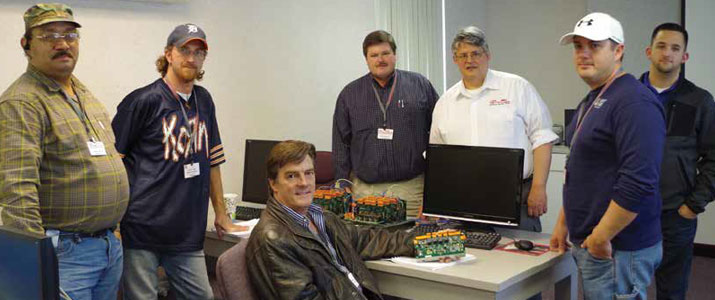
Taking Training Very Seriously
The lifeline from a company to its dealer network
- By Ralph C. Jensen
- Mar 04, 2014
 Training is the life blood of any successful organization. Training
employees on how to do their jobs better is one thing, but training
dealers and integrators on how to use and incorporate security
products is another.
Training is the life blood of any successful organization. Training
employees on how to do their jobs better is one thing, but training
dealers and integrators on how to use and incorporate security
products is another.
Training doesn’t come easy, but it is something that Galaxy Control Systems
(GCS) takes very seriously.
“When the company was formed, much of the work was with the government,
so we provided training,” said Robert Laughlin, president of Galaxy
Control Systems. “When the Navy took their business to commercial venders,
we had to transition our business model. We found it difficult, but training,
nonetheless, was a big part of our activity.”
While Galaxy still has some government contracts, most of the work is
with industrial and commercial vendors. In addition, the company has cozied
up to the National Guard in nearly every state, where they provide access
control systems and training.
“If a company does not provide training on the systems it sells, it typically
increases the overall cost of doing business,” Laughlin said. “We have found that
when we invest in training for our reseller partners, they are more successful selling
and implementing our solutions, which also results in happier customers.”
Providing Key Insight
System Galaxy Certification Training is a free service held at the company’s
Walkersville, Md. training facility and is taught by a highly-skilled, technical
team. That team is led by former University of Delaware Professor, Jeff Boyle,
who provides hands-on experience with GCS equipment and software. The
emphasis of the classroom is placed on instruction, installation, programming and troubleshooting. Students have access to a private workstation
and series 600 hardware during the
week-long course.
“The goal of our training sessions
is to keep the student engaged
and rotate our experts in and out of
the classroom throughout the year,”
Laughlin said. “Our instructors are
the same people that handle our
technical calls from dealers and integrators.
They know what they are
talking about because they have been
on the front lines of resolving issues
and answering questions.”
An American manufacturer since
1974, Galaxy is now represented in
every state in the United States and 60
countries. Their training-inspired, tech
support is available 24/7. After 5 p.m.
Eastern Standard Time, the on-call
technician handles the support duties.
“Our training team doubles as the
tech team, so we talk about how best
to help the integrator,” said Boyle,
currently technical support team
lead and training coordinator at Galaxy.
“The more we know about what
is wrong during an integration, the
better we are able to provide a fix.
The same goes for training. The more
interactive our students are, the better
we can help them understand the
access control process.”
What it Means
to be a Trainer
“Part of being a trainer is understanding
the testing and development of
the products we offer,” said Boyle.
Hired a few years ago as the fourth
technician to the team, Boyle quickly
got up to speed and harnessed his
natural tendency to teach and train.
“As I got to know the system, fully
understanding it, I naturally wanted
to pass along the information as a
trainer,” Boyle said. “Teaching has always
been the thing I enjoy doing. I
also enjoy testing the software here at
Galaxy as we upgrade it and make it
better. I sit in on the software meetings
and offer my opinion from the
tech support side.
“When an upgrade is made, we
filter it to the dealer and offer additional
training, if that is needed. We
take calls from the dealer to make
sure they understand what they have.
End users should most often work
directly with the dealer.”
Training is not open to the masses;
it is limited to only 12 seats in the
classroom setting. Boyle said that the
training program is part of the dealer/
manufacturer relationship. And,
while the setting is rather intimate, a
first-time student can really benefit,
especially if they are sitting next to
someone who has experience. Boyle
said that when students are able to
interact and work side-by-side, successful
training takes on a new light.
“This is a truly a hands-on experience
for the students,” Boyle said.
“Two students can sit together and
help each [other] along. Of course,
I am responsible for teaching and
helping students learn, but the teamwork
is amazing. When students get
it and complete the certification, they
are then released out into the ‘wild’
to practice what they’ve learned.”
In the Classroom
Boyle loves the classroom. He says that teaching can get boring, but
seeing students interpret materials
based on his presentation can make
all the difference in the week-long
series. He will sometimes present the
material differently, making the curriculum
more exciting to him.
“Most days, the teaching comes
together perfectly, and that’s when
the adrenaline kicks in,” Boyle said.
“It is easy to develop a rapport with
the students, because they want to be
there and learn, and because the topics
we are discussing are relevant to
their work.
“When things go right, I’m very
energized at the end of the week.
Even more important is when the
students realize they are going to become
certified and all the work has
been meaningful.”
Even outside of his own classroom,
Boyle said that he likes to sit
in on other classes, even if he is not
assigned to teach because there is opportunity
for him to learn, and there
are additional elements of the training
business he can take away from
others’ experiences.
Cheering for a Winner
Perhaps the biggest cheerleader of the
training process is Galaxy Executive
Vice President Rick Caruthers, who
joined the company in 2001 and has
risen from Mid Atlantic Regional
Manager to Executive Vice President.
His first goal was (and is) to make sure
the end user is happy with the product,
but also to make sure they understand
what they are using; therefore,
training quickly became a priority.
“We emphasize training at our office
in Maryland and out on the West
Coast,” Caruthers said. “We have
some much larger integrator companies
that we work with, and we bring
the training to them. We often take
our training courses on the road for
better support of our customers. In
fact, we have taken training to numerous
international locations in the
last several years.
“Training and our customer response
is our way of taking care
of the customer, whether it is an
end user or integrator. We want to
go above and beyond in providing
knowledge.”
Galaxy integrated access control
systems are sold, installed and served
by certified dealers. Company officials
call them a part of an elite international
network of fully trained
dealers. These dealers are screened
for professionalism and ethics, and
are selected because of their technical
expertise and strong commitment
to customer service.
GSC demands their dealers complete
a rigorous training program on
the installation and configuration of
the company’s access control systems
and all associated products.
“The dealers are our link to the
customer,” Caruthers said. “These are
the people who maintain the quality
and integrity of our products. Certified
dealers ensure that each system
meets, or exceeds, each customer’s
expectations.”
Dealers are the group Galaxy
really focuses on when it comes to
training; some rep firms help promote
the courses, as well. According
to Boyle, classes in Walkersville are
held about eight times a year and
training on the West Coast is held
several times each year.
Galaxy and Boyle also offer customized
courses for an end user. This
will happen when a dealer blends in
training with the sale of an access
control system. For instance, the Plano, Texas Independent School
District and Baylor Medical Center,
located in Dallas, were sold training
programs from the dealer. Courses
are tailored to just a few days of training,
and heavily address the needs of
those particular attendees.
Executive Advisory
Council
Laughlin believes so deeply in training
that he has formed an executive
council consisting of architects, engineers
and consultants. They are
involved in a quarterly meeting, and
most show up to offer direction—
rain, snow or shine. They are believers
in the training principle, as well.
“We’ve been the best-kept secret
in the access control business for too
many years,” Laughlin said. “We don’t
want to be a secret any longer. We
want to disseminate our message to
the dealers, and there is no better way
to do that than to have these people
involved in an advisory capacity.”
Security integrators’ Access Control
Group (ACG), Jackson, Miss.,
truly believe in training. They have
their own in-house training for new
employees, who, after about a year on
the job, are sent to Walkersville for additional
training on Galaxy software.
“With changing technology and
new products on the market, we
want our installers to know what is
available to us as integrators,” said
John Chism, president of ACG, and
a member of the GCS executive advisory
council. “The software training
that we receive has made us better
integrators.”
Clif King, CFO at ACG, said that
because the Galaxy training is free,
this helps the integrator balance the
bottom line, while providing the
most up-to-date software training
for their team.
Dedication to training gets to
the point for some integrators. John
J. Lutz, general manager of Guardian
Protection Services, said that the
training classroom is an excellent
representation of a learning environment,
allowing his firm to send
newer techs to Galaxy “and have
them [new techs] come back with a
really solid handle on both the hardware
and the software, without us
having to take the time to train them
in-house.”
“I think the proliferation of network-
based product places a great
obligation on the dealer to adequately
train,” Lutz said. “I’ll go as far to
say that people in the security industry
should probably consider hiring
IT-certified employees to meet the
requirement of this environment.”
Training also provides qualified
installation, and both integrators and
end users are quite conscientious
about having the job done right, the
first time, “and in the most efficient
manner possible,” said Michael S.
Ehrlich, president and CEO of Integrated
Security Inc. and a GCS advisory
board member. “Today, training
is more important than ever as
products and technology continue to
march on at a rapid pace. Experiencing
this without training would significantly
impact the bottom line and
our ability to deliver on the promises
made to clients.”
Training has been the lifeline
from Galaxy to its dealer network. It
is how they disseminate their message
to the dealer, and when the
dealer gets the message, the end user
is bound to benefit.
This article originally appeared in the March 2014 issue of Security Today.